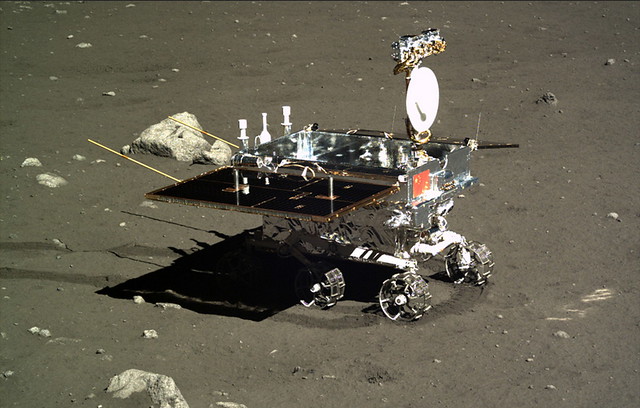 |
| Profile of Yutu, the first lunar rover since 1976, from the Chang'e-3 Panoramic Camera, from an image sequence released January 17. Click on image or here for larger view [CNSA/CLEP/CAS]. |
"Our rabbit is awake," reported Yong-Chun Zheng of the Chinese Academy of Sciences. "Instruments on the rover stood up to the challenge of the very low temperatures during the lunar night."
Followers in social media communities, both on and off the mainland, were expressing condolences over the loss of the wheeled vehicle. As dawn occurred at the landing site, February 9, while no official announcement as to the rover's fate has been released.
The rover's solar panels apparently did not retract before the beginning of its second night on the Moon in late January. The vehicle was believed to be almost certainly lost from that point, as state media reported. The panels were designed to be integral thermal protection for sensitive control circuitry.
The Chang'e-3 lunar lander, on the other hand, had successfully hibernated through its second night and been revived while the rover it had deployed soon after landing on the Moon in December was unsuccessfully buttoned-up for a second night on the lunar surface.
Scientists had feared the worst for the small rover, and awaited official announcement.Congratulatory messages from throughout the world arrived as news spread that engineers had successfully transmitted and received a signal from Yutu.
"The rover can receive commands from the ground," Zheng wrote, "and we have received data from the rover."
The extent of any long-term damage and whether efforts to properly place the rover into hibernation ahead its third lunar night will be successful are still unclear. Zheng reported, however, ground engineers are optimistic that the rover will return useful science.
"Except some sensitive components, most of the functions of the rover have been recovered, Zheng wrote. "Our experiences will contribute to future lunar missions, both with the lander and rover. Lunar and planetary missions are never easy, always sources of joy mingled with surprise, but we anticipate the brave Jade Rabbit will yet gain new discoveries on the Moon."
Yutu is the first remote-operated lunar rover successfully operated on the Moon since the Soviet Union's Lunokhod-2 in 1976.
The planetary science community throughout the world have hailed the Yutu rover's deployment from the Chang'e-3 lander, quick to point to initial science results and operations following even a single lunar night as reasons to call the still-ongoing Chang'e-3 and Yutu missions successful.
Related:
Geologic characteristics: Chang'e exploration region (January 31, 2014)
Yutu controllers wait for February 9 sunrise (January 31, 2014)
Problems with solar-powered Yutu rover before nightfall (January 25, 2014)
Chang'e-3 and Yutu survive first lunar night (January 14, 2014)

No comments:
Post a Comment